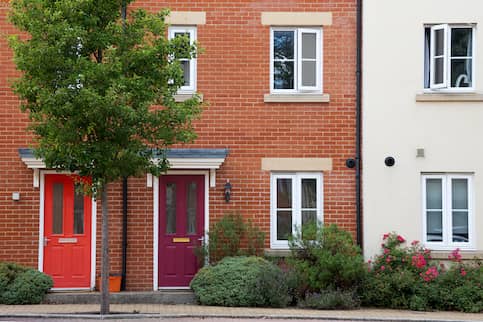When you have a mortgage, your escrow account enables you to make payments toward your property taxes and insurance in more manageable, monthly increments, rather than having to cover these costs all in one big lump sum each year.
When that account doesn’t have enough money in it to cover these costs, however, that’s called an escrow shortage. Why does this happen? Let’s take a look.
What An Escrow Account Does
First, let’s go over the basics of escrow accounts and why they’re so vital to your mortgage.
Most borrowers’ mortgage payments are made up of four different pieces: principal, interest, taxes and insurance. You might see this abbreviated as PITI.
The principal and interest portion of your payment directly relates to your mortgage; principal is what you pay toward the base amount you owe, and interest is, naturally, the interest you’re charged on that amount.
Taxes and insurance refers to the property taxes you’ll need to pay on your home, your homeowners insurance premium and – if applicable – your mortgage insurance premium. Tax and insurance payments don’t go directly to your lender or loan servicer, but they will collect a portion of these payments each month and hold them in a third-party escrow account until those bills come due, at which point your servicer will pay these bills on your behalf using the money in your escrow account.
See What You Qualify For
Buy A Home
Discover mortgage options that fit your unique financial needs.

Refinance
Refinance your mortgage to have more money for what matters.
Tap Into Equity
Use your home’s equity and unlock cash to achieve your goals.
Where Escrow Money Comes From
Your escrow account is funded by your monthly mortgage payments. Let’s look at an example:
You buy a home that has an annual property tax bill of $4,500 and costs $1,500 per year to cover with a homeowners insurance policy.
Paying all of this in one lump sum, or even divided into semiannual payments, can be tough on your wallet. So instead, your mortgage servicer divides each of these numbers by 12 to find out how much money you’ll need to set aside each month to ensure you have enough to cover your full bill for the year once it becomes due.
4,500 ÷ 12 = 375
As we can see from the equation above, you’ll need to set aside $375 each month to ensure that you have the $4,500 to pay your property taxes.
1,500 ÷ 12 = 125
To cover your homeowners insurance premium, you’ll need to set aside $125 each month to have enough for the year.
Your mortgage servicer will add both of these numbers to your principal and interest payment, which happens to be $1,200.
1,200 + 375 + 125 = 1,700
So, your full monthly mortgage payment would be $1,700. You’ll pay this amount to your servicer, who will take the principal and interest as payment for your mortgage and then put the rest into your escrow account.
In this way, escrow acts as a sort of savings account, where you put in a little bit of money each month to avoid having to make one large lump sum payment when taxes and insurance are due.
Find A Mortgage Today and Lock In Your Rate!
Get matched with a lender that will work for your financial situation.
The Role Of The Yearly Escrow Analysis
Escrow analyses are performed by your lender or servicer at least once per year. This analysis will tell you if you have a shortage and if your monthly payments will be increasing in the next year due to an increase in your taxes or insurance rate.
In your escrow analysis, your servicer will project how much you’ll owe out of your escrow account in the coming year, and they’ll use that number to calculate your new monthly payment. Your payment might stay the same, go up or, less commonly, go down.
If you have an escrow shortage due to an increase in your property tax rate, for example, you’ll likely have a higher monthly payment going forward to ensure you have enough in your escrow account to cover the increase.
An Escrow Shortage Example
Let’s go back to our example of your monthly mortgage payment of $1,700, with $500 of that going to your escrow account each month – $375 for property taxes and $125 for insurance.
This year, when you get your escrow analysis, you find out that your property taxes have increased from $4,500 to $5,000. So, for this past year, you actually needed to put aside about $417 each month to cover your property tax bill (5,000 ÷ 12), not $375. Because of this, your escrow account now has a shortage.
Not only will you need to pay your lender the shortage amount, but your monthly payment will also go up to reflect the increase in your taxes. So, instead of your initial $1,700, your monthly payment would increase to about $1,742 (assuming your insurance premium stays the same).
Compare And Save
Have control over your money. Shop all your financial options in one place.
Escrow Shortage FAQs:
How Can Escrow Go Up If I Have A Fixed-Rate Mortgage?
Remember that the interest you pay on your mortgage is part of what you pay to your lender – it doesn’t go into your escrow account, because it’s a part of your actual mortgage. If you have a fixed-rate mortgage, your interest rate will remain the same for your entire mortgage term.
The costs that your escrow account covers, taxes and insurance, are included as part of your total monthly mortgage payment, but they’re separate from the actual mortgage. Your lender or servicer doesn’t control these costs. Local governments are responsible for property tax increases and homeowners insurance companies set their own rates.
Think of it this way: if you have a fixed-rate mortgage, the mortgage part of your payment will stay the same. However, the portion of your payment that goes to your escrow account can change if your tax or insurance costs change.
Does An Escrow Analysis Really Only Happen Once A Year?
Escrow analyses are sent out to borrowers once per year. However, it’s possible for a lender or servicer to complete more than one analysis in a year if there are issues with the first one or if the borrower disputes their analysis. Typically, though, they’ll do just one escrow analysis each year.
What Is The Difference Between An Escrow Shortage And An Escrow Deficiency?
With an escrow shortage, you still have money left in your escrow account, but not enough to pay your tax and insurance bills.
If you have an escrow deficiency, that means that your escrow account has a negative balance. This can happen if your tax or insurance bills came due and you didn’t have enough money in your account to cover them, so your lender had to pay the remaining balance for you using their own funds.
How Do I Pay Off An Escrow Shortage?
Many lenders allow borrowers to either pay their escrow shortage in one lump sum or to spread out the payment in equal monthly installments over a 12-month period.
Can I Pay My Escrow Shortage Online?
This will depend on your lender, but if you can make your regular monthly payments online, you’ll usually be able to make one-time payments, including escrow shortages, online as well.
Can I Pay My Escrow Shortage With A Credit Card?
You most likely won’t be able to pay your escrow shortage with a credit card, since mortgage lenders typically don’t allow borrowers to use credit cards to make mortgage payments.
How Can I Avoid An Escrow Shortage?
It can be difficult to avoid an escrow shortage, since it’s not always possible to anticipate changes to your tax and insurance costs. However, you can be proactive by keeping track of your escrow account and having some additional savings set aside for unexpected home-related costs, such as an escrow shortage.
The Bottom Line: Be Prepared For Escrow Shortages
Though escrow accounts come with the benefit of making your yearly tax and insurance payments more manageable, it’s important for borrowers to understand that, even with a fixed-rate mortgage, changes to your taxes or insurance can lead to an escrow shortage and a higher monthly payment.
As a homeowner, it’s always good to be prepared, especially for unanticipated one-time costs or increases in your regular costs. When it comes to your escrow account, keeping an eye on it and having a savings cushion can help prepare you in the event that you end up with a shortage.

Molly Grace
Molly Grace is a writer focusing on mortgages, personal finance and homeownership. She has a bachelor's degree in journalism from Indiana University.












